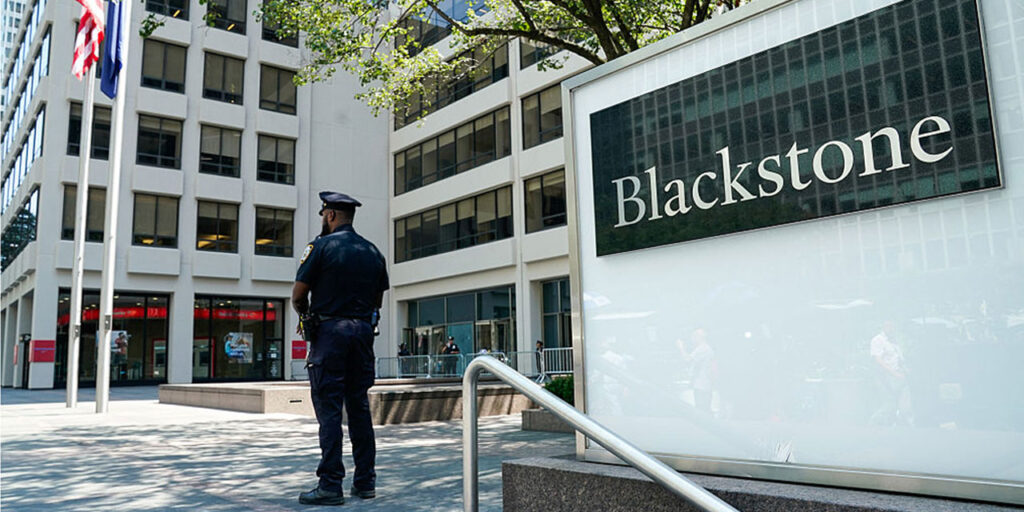Wesley LePatner was a senior managing director at Blackstone, the world’s largest alternative asset manager. She was CEO of the firm’s Real Estate Income Trust—a $53 billion portfolio. She was also a mother of two, a philanthropist, and an engaged member of New York’s Jewish community. On Monday, she was shot and killed in the lobby of her midtown Manhattan workplace, one of four victims of Shane Tamura’s murder spree.
There’s some evidence that her killer was targeting the National Football League, which shares an office building with Blackstone. But within hours, it was clear that his motive was irrelevant to the hordes now celebrating LePatner’s execution online. Across Reddit, Facebook, X, and other social media platforms, users—many anonymous, and some displaying transgender or Palestinian flag emojis—seized on the executive’s death as symbolic retribution. Her position at the investment firm became a license for cruelty. Commenters mocked her success, dismissed her philanthropy as sinister, and portrayed her employer as an unmitigated force for evil. The message was unmistakable: her death was something to relish.
Finally, a reason to check your email.
Sign up for our free newsletter today.
This grotesque display is part of a broader trend of class rage and Internet nihilism that justifies violence by turning innocent victims into scapegoats for moral fury. The permission structure for such ghoulishness is now fully operational. What were once the disturbing mutterings of the fringe are now public, performative, and proudly cruel.
A political movement is testing its power. Call it Luigism.
Invoking Luigi Mangione—the Ivy League–educated radical who allegedly assassinated UnitedHealthcare CEO Brian Thompson last December—Luigism is the idea that violence is a legitimate response to the perceived injustices of capitalism. If the victim represents wealth, whiteness, pro-Israel Judaism, or institutional power, the killing can be framed as justified, or even glamorous.
Mangione has yet to stand trial, but he’s already been canonized. Social media is awash in fan art. Influencers praise his good looks. Merch with the slogan “Mama, I’m in Love with a Criminal” is available for purchase. A “Free Luigi” community has tens of thousands of members. More than $1 million has been crowdsourced for his legal defense, and according to polling, more than 40 percent of voters under 30 say Thompson’s killing was “acceptable.”
What makes Luigism dangerous is its memeified brutality. Innocence doesn’t matter. Context doesn’t matter. What matters is what the victim represents, and whether their death can be hash-tagged as justice. It is a worldview built on scapegoats and sacrifices.
Luigism isn’t confined to digital cesspools like TikTok, Tumblr, or Twitch. Its logic is now creeping into mainstream institutions. Recall the words of Senator Elizabeth Warren following Thompson’s assassination: “Violence is never the answer,” she said, “but people can only be pushed so far.” That equivocation is a tell: when violence is seen as the inevitable outburst of legitimate grievance, condemnation becomes conditional.
The most prominent political figure to flirt with Luigism is arguably Zohran Mamdani, the man most likely to be New York City’s next mayor. One of Mamdani’s top aides lauded the UnitedHealthcare CEO’s killer. And Mamdani himself has called the NYPD “wicked and corrupt,” argued that “queer liberation means defund the police,” and pledged to disband the department’s Strategic Response Group—the very unit that responded to Monday’s shooting.
Pair that with the millennial socialist’s position that billionaires should not exist and private property ought to be abolished, and his defense of chants to “globalize the Intifada.” It’s all rooted in the same moral arithmetic that for others justifies violence based on identity and class status. Mamdani doesn’t explicitly endorse murder, of course, and he condemned Monday’s killings. But the radical politics he champions seem to have made it thinkable to others.

Luigism’s hatred of institutions like Blackstone is also intellectually dishonest. Activists accuse the firm of driving evictions, inflating rents, and worsening racial inequality. But a recent study by UC Berkeley’s Konhee Chang found the opposite: when corporate landlords like Blackstone acquire homes in suburban neighborhoods, rents tend to fall and racial segregation declines. In many areas, Blackstone’s market activity has made once-white suburbs more accessible to minority renters. But none of that matters when the goal is symbolic revenge.
There’s an anti-Semitic throughline, too. The same online mobs that celebrated LePatner’s killing cheered the targeted firebombing of Jewish Pennsylvania governor Josh Shapiro’s home and the assassination of two Israeli embassy staffers in Washington, D.C.
This tendency is rooted in the Left’s anti-whiteness. But explicit anti-whiteness would implicate the very people who subscribe to Luigism—demanding guilt, confession, and solidarity from within. Anti-Semitism, by contrast, points outward. It offers a ready-made villain: successful, visible, and linked to global institutions. And unlike whiteness, Jewishness can be conditionally forgiven—so long as the Jew disavows the Jewish state and tradition. It is a resentment that feels clarifying and righteous to those eager to collapse politics into vengeance.
Wesley LePatner wasn’t murdered for her politics, her work, her wealth, her ethnicity, or her philanthropy. But those things led a growing contingent of nihilists to celebrate her death. That’s the dark power of Luigism: it doesn’t need clear or coherent motives to inflict serious damage on the social fabric.
Photo 1 by Leon Neal/Getty Images, Photo 2 by TIMOTHY A. CLARY/AFP via Getty Images
City Journal is a publication of the Manhattan Institute for Policy Research (MI), a leading free-market think tank. Are you interested in supporting the magazine? As a 501(c)(3) nonprofit, donations in support of MI and City Journal are fully tax-deductible as provided by law (EIN #13-2912529).
Source link

















